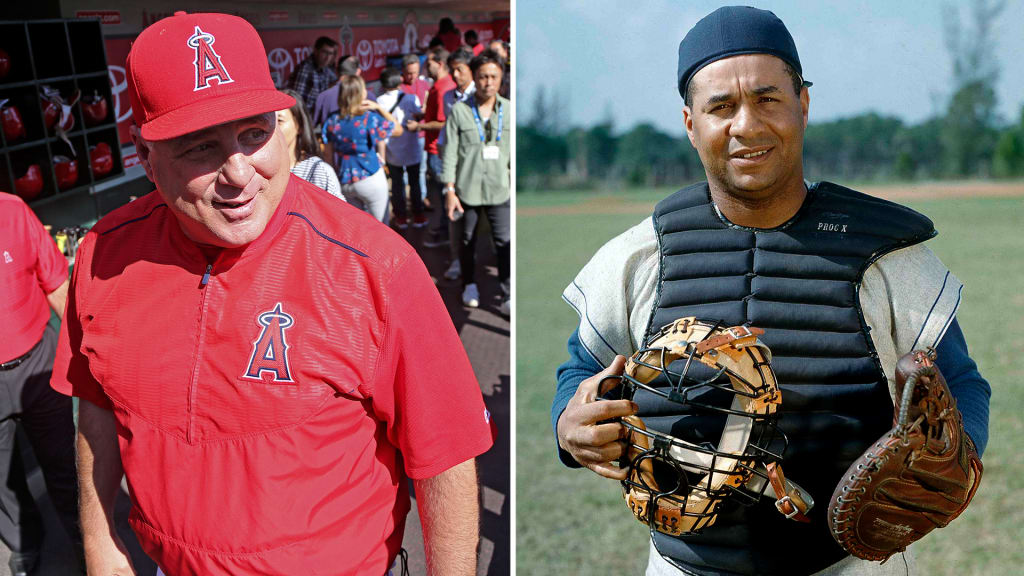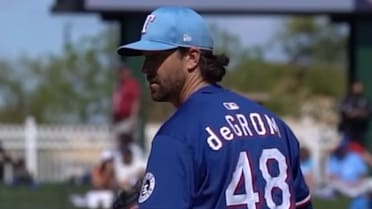Scioscia: Campanella's mentorship 'an honor'

The Negro League Baseball Museum is celebrating the 100th anniversary of the start of the Negro Leagues, and MLB.com’s Bill Ladson has written a series of articles on some of the league’s legends. This one is about Dodgers three-time MVP Roy Campanella, with recollections from Mike Scioscia.
NEW YORK -- One can hear the joy in Mike Scioscia’s voice as he talks about Hall of Famer Roy Campanella.
During Scioscia’s playing days with the Dodgers organization, which began in the Minors in 1976, the former Angels manager learned about the art of catching from Campanella. Before anyone knew it, Scioscia had become Campanella’s protégé. They knew each other for 15 years, and the way Scioscia saw it, God gave him a gift.
“He was always on the field,” Scioscia said about Campanella via telephone. “He was an active coach. He was right next to me when we were doing drills. He would give insights -- not only [to] me, but [to] any catcher that was there. But I was fortunate enough, because he took a little more interest in me because we were both from Philadelphia. He talked about what it was like to grow up there. I talked about Delaware County. He would roll his eyes and say, ‘Delaware County. That’s not Philly.’ The way he connected with people was uncanny. He had a confidence when he talked. He could instill advice that was going to make you a better player. In doing that, he made us all better people.”
Campanella was paralyzed from a car accident in January 1958, but he became mainstay of the Dodgers' community-service division until he died on June 26, 1993. During Spring Training, Campanella was also a coach, and he often gave Scioscia sage advice. A lot of it came from from Biz Mackey, who played with Campanella in the Negro Leagues.
“It was an honor to have [Campanella] as a mentor,” Scioscia said. “He means everything to what I believe is bigger than a baseball career … your character. Outside of my parents, brother and sister and wife, no one had a bigger influence on my life like Roy Campanella.”
Because of Campanella and others in the organization, Scioscia ended up becoming a fantastic defensive catcher, even though he never won a Gold Glove Award. Who can forget how Scioscia blocked the plate? He hung in there tough and would do anything to save a run. And his game-calling was out of this world.
Scioscia was behind the plate in 1988 as Orel Hershiser set a Major League record by throwing 59 consecutive scoreless innings.
Maybe Campanella’s best advice was about pacing himself during the season. Campanella told Scioscia a lot about his nine years playing in the Negro Leagues, and how to endure catching through hot summers. Campanella advised Scioscia to pace himself off the field, not on the field.
“That’s a tremendous lesson for a baseball player coming up," Scioscia said. “The demands of the season are always there. There’s no room for pacing yourself on the field. The thing about Roy, he would say, ‘You can’t pick and choose parts of catching that you like. You have to take the whole package. You are going to take the foul tips just as much as you hit home runs.’
“As we talked, he never talked about any of the things he wasn’t able to accomplish in his life because of the car accident. He was always so positive and forward-thinking.”
Scioscia was a member of the Padres when Campanella died in 1993, and he has never stopped thinking about Campanella in the years since. Two years after being named manager of the Angels, Scioscia and his team were in the 2002 World Series against the Giants. Scioscia’s wife, Anne, decided to bring Campanella’s wife, Roxie, to the pivotal Game 7. An hour before first pitch, Scioscia’s phone rang and the guard informed him that Anne and Roxie were waiting to see him outside the locker room.
“You are thinking, an hour before Game 7 of the World Series, you are really busy. But I said, ‘Absolutely, come on in.’ Roxie gave me a big hug,” Scioscia said. “She used to call me by my last name. She said, ‘Roy is with you today. You will win today.’
“After we won, she came down and we spent 45 minutes together in the clubhouse. Knowing Roy and Roxie, it was more than just a baseball relationship. All the things he instilled in me, he probably didn’t realize what he was doing. We were just talking about baseball and life. He was an incredible human being.”
Bill Ladson has been a reporter for MLB.com since 2002. He covered the Nationals/Expos from 2002-2016.




